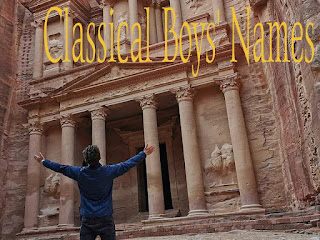Classical Boys' Names

The ancient times conjure images of gods with arrows and horse chariots. There is a set of names that make people imagine the same things. Classical, or ancient, boys' names have been used during and strong resonate with ancient times. It is not enough for a name to hail from ancient mythology; mythological names often have ancient roots, but not all were common ancient names. Here are some classical boys' names with ancient usage: Aeneas Albus Alexander Amadeus Andreas Antonius Archimedes Augustus Aurelius Caesar Caius Cassius Cato Cicero Claudius Constantine Cornelius Cyrus Darius Decimus Demetrius Erasmus Euclid Fabian Flavius Gaius Hadrian Hector Ignatius Isidore Julius Junius Leonidas Lucius Lysander Marcellus Marius Maximilian Maximus Octavius Ovid Peregrine Pericles Philo Quintus Remus Septimus Severus Silvanus Theophilus Theseus Tiberius Titus Tycho Ulysses Valerian Virgil Vitus Xerxes Zeno What names would you add to the list?


